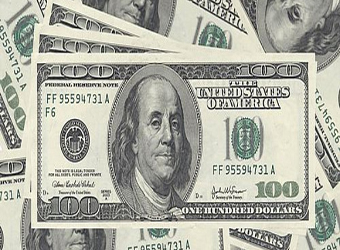Dollar prices found some traction on Monday following last week’s steep fall and managed to hold above a three-year low against a basket of currencies.
The dollar index against a group of six major peers was mostly steady at 89.045 after enjoying a modest bounce on Friday following its descent to 88.253, its lowest since December 2014.
The U.S. currency has been weighed down by a variety of factors this year, including concerns that Washington might pursue a weak dollar strategy and the perceived erosion of its yield advantage as other countries start to scale back easy monetary policy.
Confidence in the dollar has also been shaken by mounting worries over the U.S. budget deficit which is projected to balloon to $1 trillion in 2019 amid a government spending splurge and large corporate tax cuts.
While these negative factors were not expected to go away any time soon, last week’s downturn was so rapid that some buyers were seen to have waded in to pick up the greenback at perceived bargains.
“The slide by the dollar last week was perhaps overdone – for example, the dollar’s drop to the mid 105 yen level was too rapid,” said Yukio Ishizuki, senior currency strategist at Daiwa Securities in Tokyo.
“As such we are seeing the dollar rebounding, which is quite natural given the scale of its recent fall.”
The dollar was little changed at 106.330 yen after sliding on Friday to 105.545, lowest since November 2016.
Longer term, the U.S. currency’s outlook remained uncertain.
“Inflation worries and concerns about the U.S. fiscal and trade deficits will keep the dollar on the defensive,” said Masashi Murata, senior strategist at Brown Brothers Harriman in Tokyo.
“In addition to major currencies like the yen and pound, a significant portion of the selling pressure on the dollar is expected to come from emerging currencies, which either enjoy high yields or are supported by current account surpluses.”
The euro was nearly flat at $1.2423. The common currency surged to a three-year high of $1.2556 on Friday before slipping to post a loss of 0.7 percent.
The euro’s strength has played a large role in weakening the dollar this year. Focus was on economic indicators due this week, such as Wednesday’s euro zone purchasing managers’ index and Friday’s German gross domestic product numbers, and whether they could propel the common currency higher again.
The pound was a shade higher at $1.4045 after losing 0.5 percent on Friday.
The Australian dollar rose 0.3 percent to $0.7932 after losing 0.5 percent the previous day. Source: Reuters
Source: Reuters
